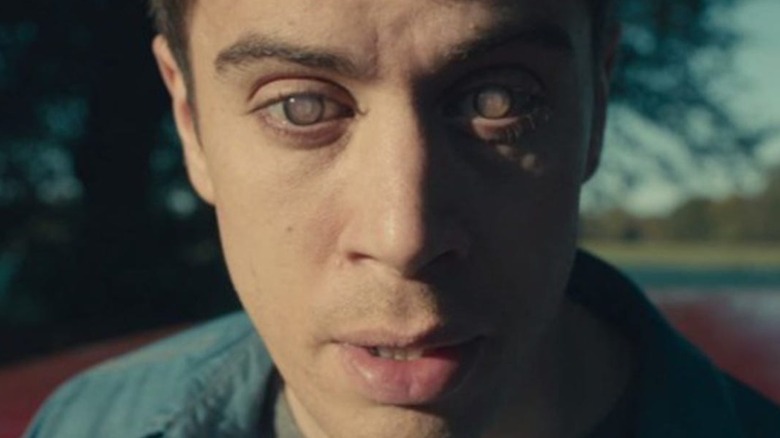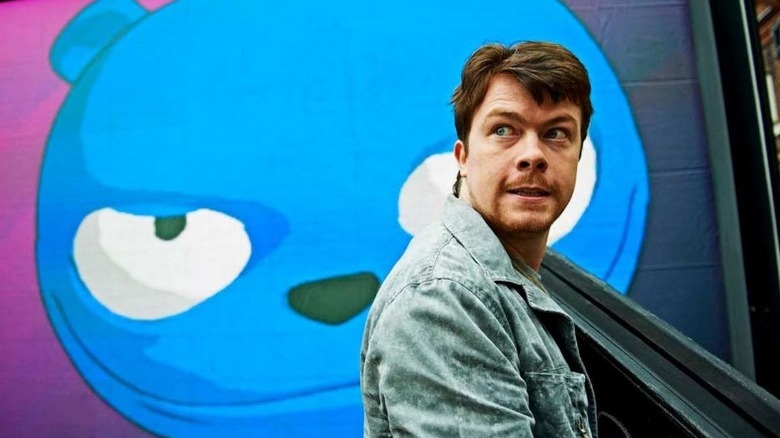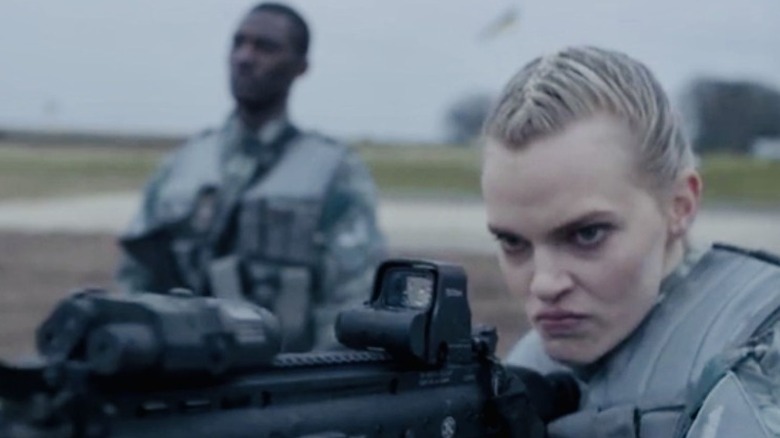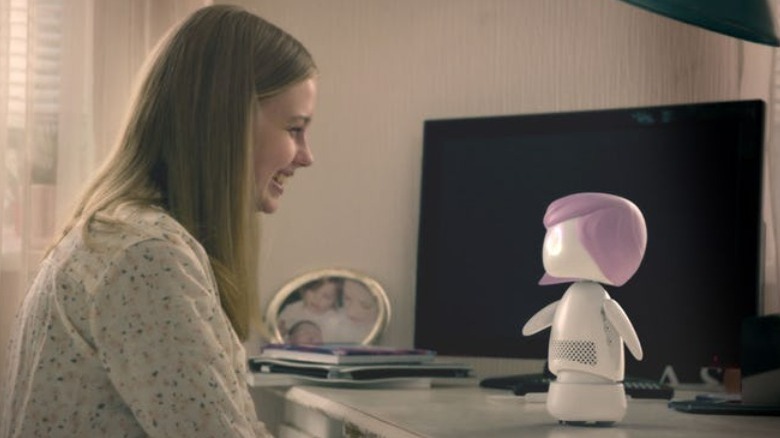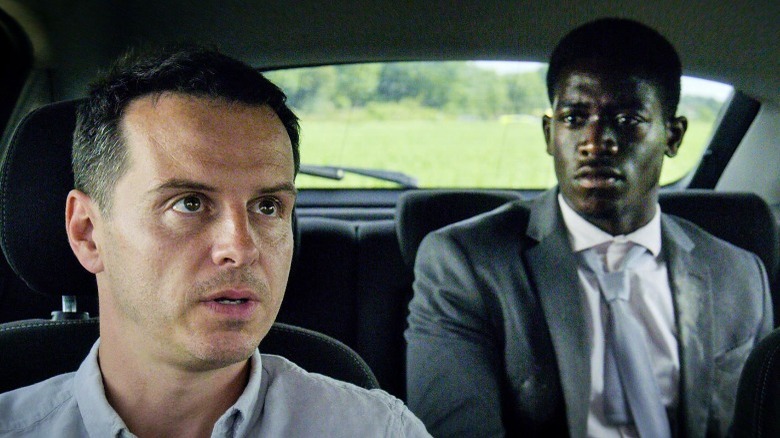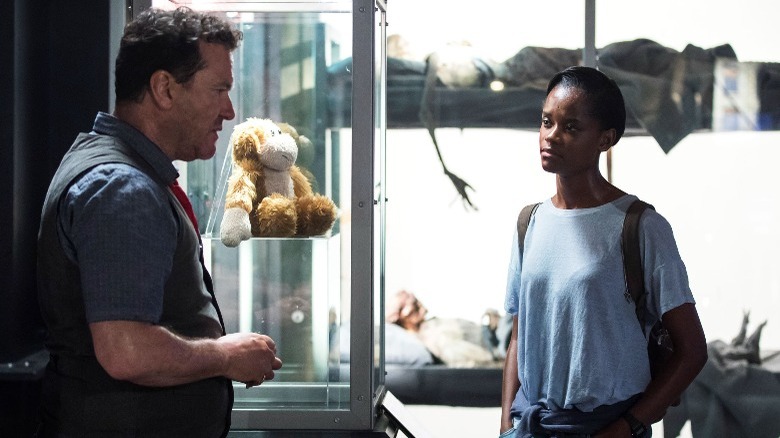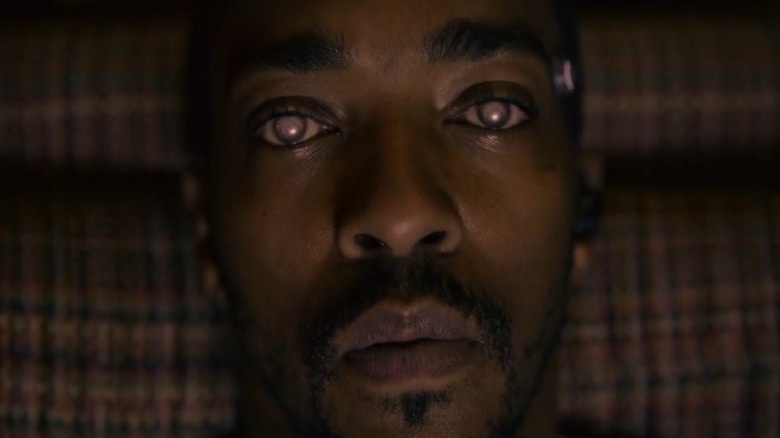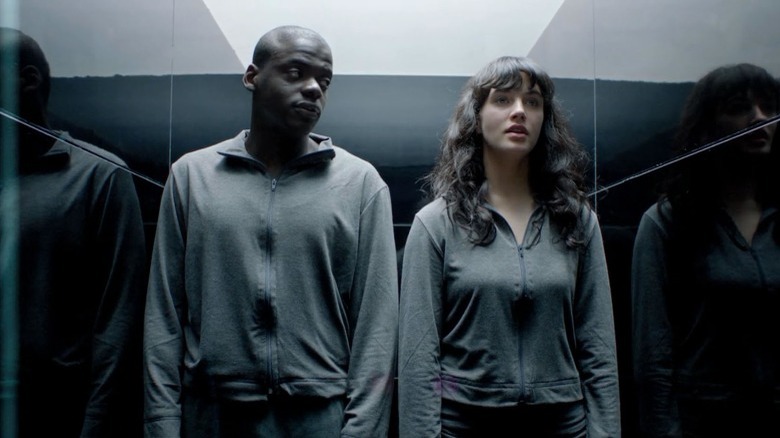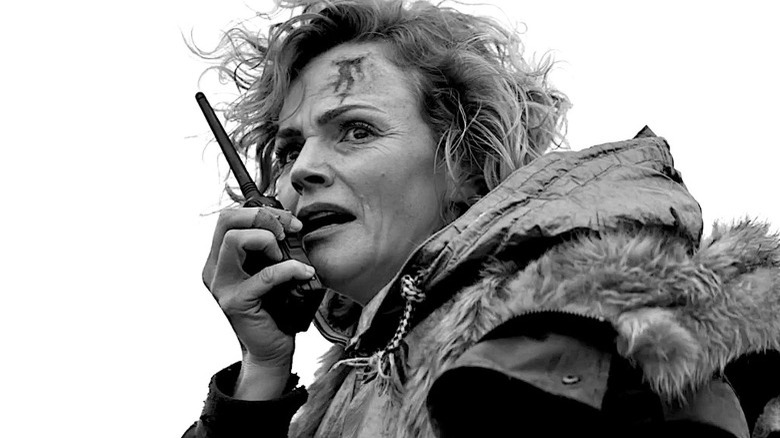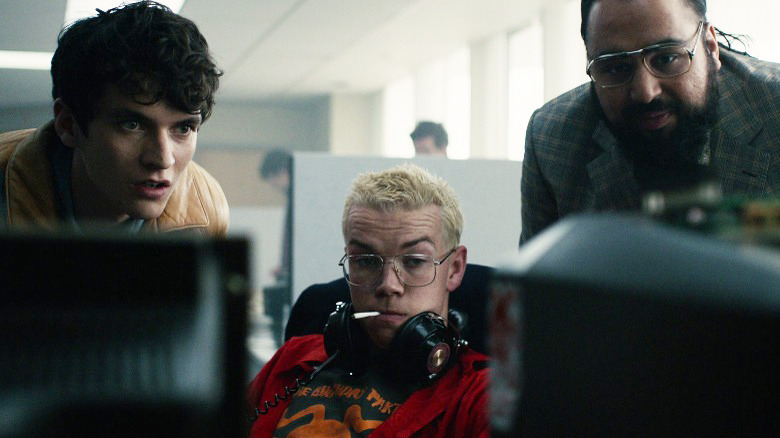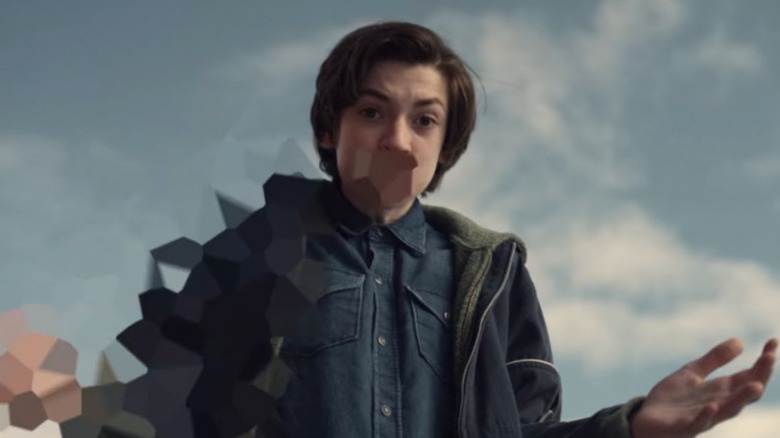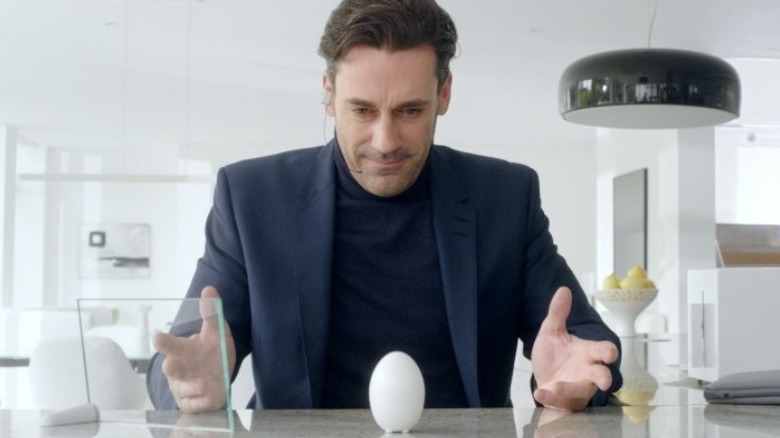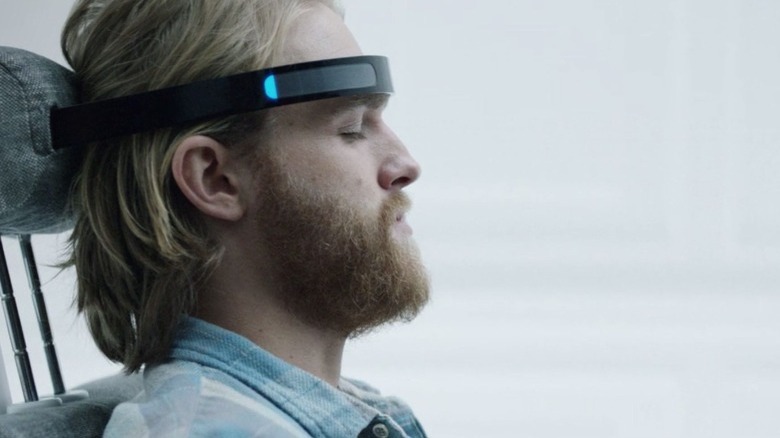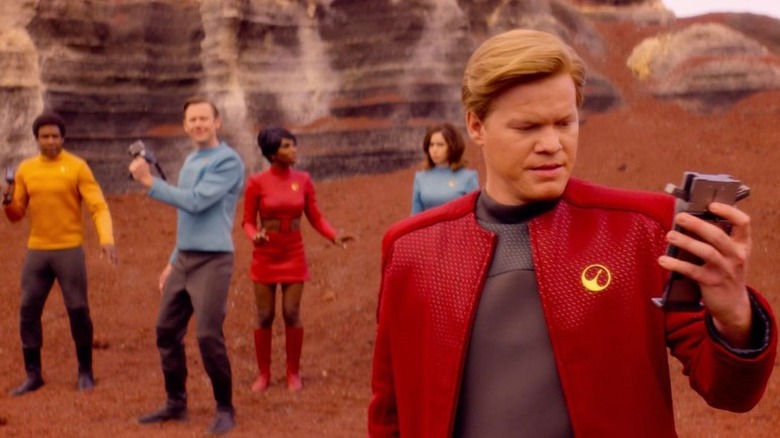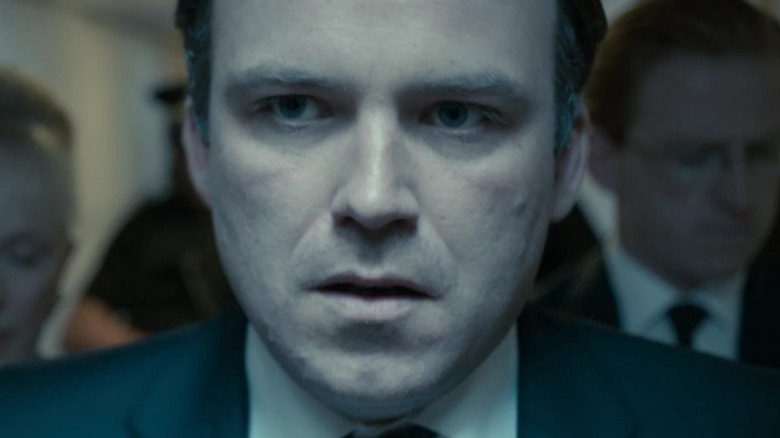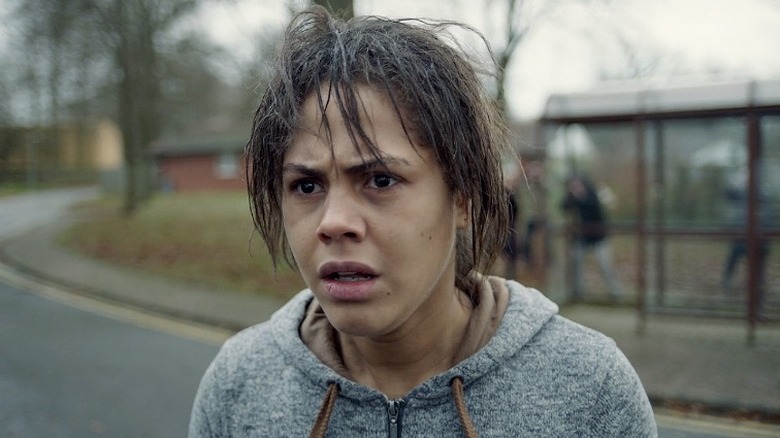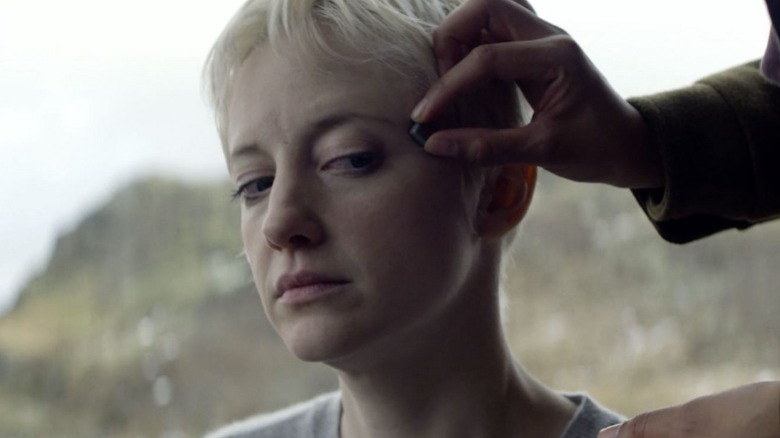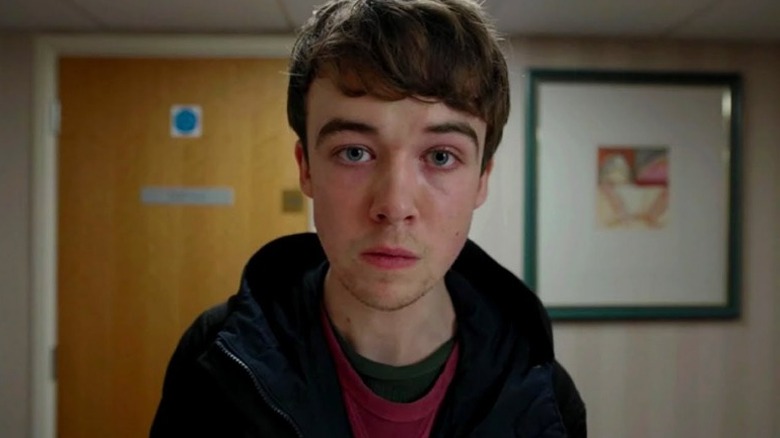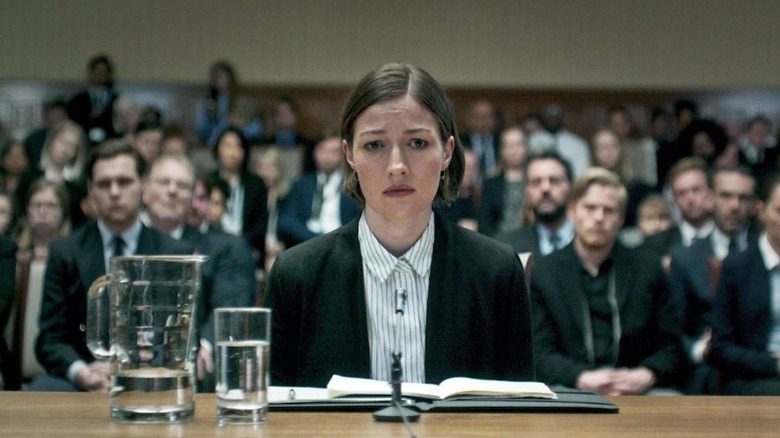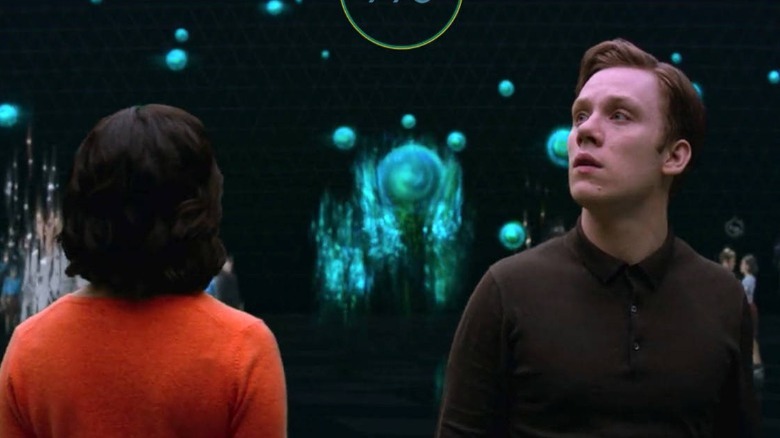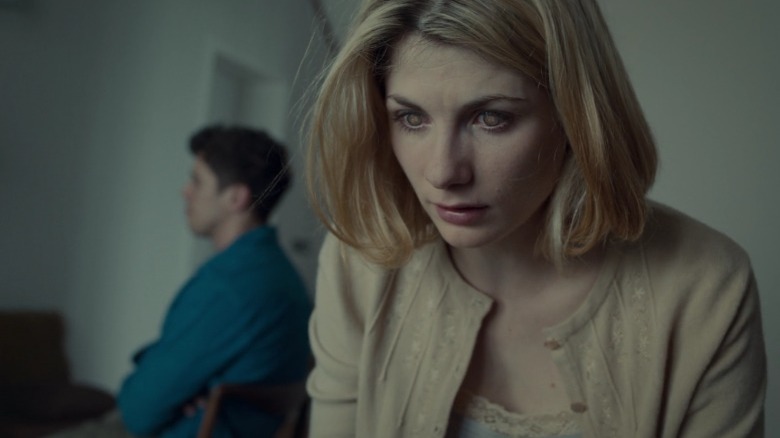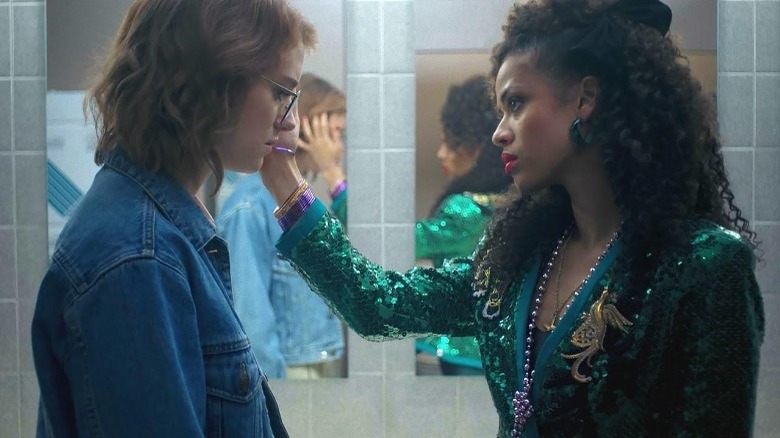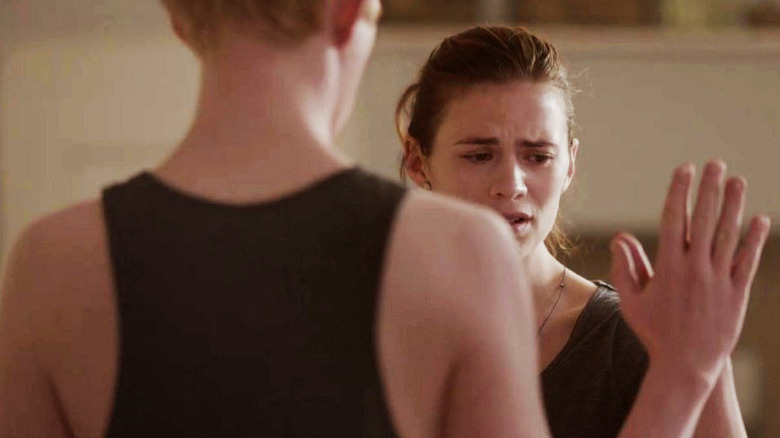Every Black Mirror Episode Ranked Worst To Best
Picking up where "The Twilight Zone" left off, Charlie Brooker's seminal anthology series might be a little more hit-and-miss than "Inside No.9," but where it excels is in the use of technology. Often described as "techno-paranoia," it retains the ability to regularly devastate audiences. The thing that makes "Black Mirror" stand apart from most science fiction series is that Brooker is never content to simply say, "Imagine if this was possible," but instead looks at precisely how advanced technology is applied to universally recognizable situations.
The way technology has infiltrated every part of our lives is a constantly relevant starting point for the series. Sometimes heartbreaking, often disturbing, and invariably teeming with existential dread, "Black Mirror" is one-of-a-kind. With the May 2022 announcement of a new season, and Brooker's continued involvement uncertain, now is the perfect time to take stock of his time at the helm of one of the most unique TV series of all time by ranking every episode to date.
23. The Waldo Moment (Season 2, Episode 3)
"The Waldo Moment" has its moments, but the result is never as clever or edgy as it thinks it is. The satire is also too broad to make a coherent point, other than "politicians are bad." Daniel Rigby is a talented actor but he isn't given enough nuance as the voice of a cartoon character put forward as an independent candidate in a local election. He's a priggish character who is never presented with much depth. Ultimately, it's a bit of a problem when the stuck-up Tory MP (Tobias Menzies) emerges as more sympathetic and reasonable than the erstwhile protagonist.
This episode has seen a bit of rehabilitation recently, at least in part due to its prescience in making a mockery of the electoral system. In truth, though, the reason it's not well-liked is simply because the jokes are flat, the main character is never given a chance to be likable, and the less said about that final scene the better.
22. Men Against Fire (Season 3, Episode 5)
One of the few episodes of "Black Mirror" that falls flat, almost entirely because of the ham-fisted messaging behind it. There's nothing wrong with the performances in "Men Against Fire," and the effects are suitably grisly in the scenes with the "Roaches," but the allegorical side of the story is just too broad and incredibly obvious to anyone who has seen "Starship Troopers." The overarching message comes across as more preachy than satirical.
It's also one of the few episodes that is completely devoid of humor or irony. In some episodes, this is excused by the strength of the storytelling, but in "Men Against Fire" it all comes down to that twist, which most of us can see coming from a mile away. It's not a bad episode of television but it lacks the depth of the best episodes. It is mainly interesting now for a pre-"Succession" appearance from Sarah Snook.
21. Rachel, Jack and Ashley Too (Season 5, Episode 3)
"Rachel, Jack and Ashley Too" might be the most atypical "Black Mirror" episode of the entire series, veering too often into sentimentality and adolescent wish fulfillment. The story follows a teen idol pop star (Miley Cyrus) who is drugged into compliance by her possessive management, leaving two diametrically opposed sisters to rescue her with the help of an A.I. robot that is somehow imbued with the singer's consciousness. The vagueness of this plot point is symptomatic of the problems with this episode, in that the leaps of logic within the story, and the implausibility of the plot machinations, make it too far-fetched for a series that has always had at least one foot in the real world.
It also lacks that sardonic edge that even the most lighthearted episodes of "Black Mirror" have, with cheesy humor and fluffy mawkishness that feels more akin to something from the Disney Channel. "Rachel, Jack and Ashley Too" is a fun romp with an impressive performance from Miley Cyrus, but it just misses the mark tonally. It's uneven, messy, and feels more like a teen angst story than an episode of "Black Mirror."
20. Smithereens (Season 5, Episode 2)
"Smithereens" is a compelling hour of television but it's one that never really feels like "Black Mirror." It's only very loosely linked to the series' themes, in the way the public is shown to be over-reliant on social media apps. Andrew Scott gives a blistering performance as a taxi driver pushed over the edge. He abducts an intern (Damson Idris) for the titular social media company, Smithereen, and uses him as leverage to speak to the company's CEO (Topher Grace).
The episode isn't particularly original or incisive and is let down by a plodding plot and paper-thin characterization, including an over-the-top turn from Grace as a parody of the worst kind of modern CEO. It all feels a little inconsequential, with artificially heightened stakes that defy believability. That it's watchable at all is almost entirely due to Scott's dynamic, emotionally raw performance, rather than the plot itself, which is a bit of a problem. The climax is also a letdown, ending with a contrived cliffhanger and a pithy punchline that undercuts all the tension that's built up over the episode.
19. Black Museum (Season 4, Episode 6)
An uneven anthology episode that could never live up to the promise of "White Christmas," "Black Museum" has a surprising lack of depth to its numerous intriguing story set-ups. It has its share of effective skin-crawling moments, but these never cohere to any greater meaning beyond gory sensationalism.
It doesn't help that the stories are told to us by a character within the plot (Douglas Hodge), meaning we are never as involved as we would be if we were immersed in the stories from the start. There's a grim detachment from the stories, and while the man who gets aroused by pain is a horribly visceral story, the rest of the episode is less interesting, and the final reveal is both arduously convoluted and increasingly obvious as the episode goes on.
Douglas Hodge gives a great performance as the gleefully callous narrator — the polar opposite of Rafe Spall's tortured protagonist in "White Christmas." However, there is no nuance to the character, and as such the episode loses a lot of tension. It's also very self-indulgent, apparently more concerned with self-referential nods and Easter eggs than developing its central characters beyond the broadest of broad strokes.
18. Striking Vipers (Season 5, Episode 1)
Perhaps the most candidly accurate depiction of how humans engage with new technology, in that no sooner is it available for use than we immediately mine it for sexual gratification. "Striking Vipers" is the story of two friends who take an interactive fighting game to a new level of intimacy.
This one ranks higher than the other episodes of the most recent season for the strength of its premise, and the charismatic performances of Anthony Mackie and Yahya Abdul-Mateen II, both of whom sell the sheer awkwardness of their situation really well. However, ironically for an episode concerning the awkwardness of intimacy between male friends, it ultimately bites off more than it can chew, and in the end says very little. It's almost as if Charlie Brooker himself finds the subject too uncomfortable to go into with any real depth, and as such it lacks the incisive social commentary of the series' best episodes, with an unsatisfying cop-out of an ending.
17. Fifteen Million Merits (Season 1, Episode 2)
Co-written by Charlie Brooker's wife Konnie Huq, "Fifteen Million Merits" is one of the few episodes that feature a classic dystopian setting, with some truly Orwellian plot turns. The sheer attention to detail is incredibly impressive, as the unfortunate protagonists are compelled to cycle on exercise bikes all day long in order to earn merits. Amidst the monotonous day-to-day slog, Bing (Daniel Kaluuya) thinks he's found a way out when he hears Abi (Jessica Brown Findlay) singing and enters her in the ubiquitous talent show, "Hot Shot."
The world-building is incredibly detailed but falls apart under close scrutiny, raising more questions than it answers. However, there are some elements that feel hauntingly believable. The way the cyclists have to pay to skip advertisements is something that feels all too plausible, and the added trauma of having an alarm sound when you try to close your eyes makes it a special kind of hell.
Where the episode falls down is in the talent contest conceit that runs through it. The message that everyone will degrade themselves for a reward is a little on the nose, and while the final image is a potent and fatalistic one, it isn't the most original concept. The episode contains an effective, powerful message, but it's delivered with the subtlety of a sledgehammer.
16. Metalhead (Season 4, Episode 5)
Often derided for its lack of plot, "Metalhead" might be a blunt instrument compared to some of the more sophisticated episodes of the series, but it's an infinitely scarier depiction of a future dominated by machines. The shortest episode by some margin, it's a sparse, lean story with minimal dialogue and a simple narrative — survive.
Maxine Peake plays the leader of a small group of survivors in a post-apocalyptic wasteland frantically trying to evade a pack of murderous robot dogs. They can't be reasoned with, can't be satiated, can't be stopped. So no, "Metalhead" might not be the most thought-provoking episode of the series, but that's partly the point. When the enemy is as ruthless as this, there's no witty back and forth; all you can do is run.
It's a relentlessly tense episode with some horrifically disturbing imagery, and stark black-and-white cinematography that really underlines just how unforgiving this world is. The pared-back story is incredibly effective in its fatalism, with a bleak ending that feels entirely in keeping with this brutal setting.
15. Black Mirror: Bandersnatch
It's difficult to rank "Bandersnatch" alongside the other episodes of "Black Mirror," quite simply because it's like no other episode of television. An interactive, choose-your-own-adventure story about a retro videogame, the logistics alone are nigh impossible, so the fact that it exists at all is a testament to the entire creative team behind it. An audacious and refreshing concept that is executed perfectly at least on a practical level, you end up just wishing that the story itself was more interesting.
The plot has potential, and the numerous choices that the viewer makes lead to an eclectic range of blind alleys — the martial arts fight with the psychiatrist (Alice Lowe) is a highlight. However, playing around with all the different options leads to diminishing returns, with numerous ham-fisted meta allusions to free-will and determinism. Whatever options you select along the way, the ending is invariably underwhelming.
One thing you can't deny though, is the sheer vaulting ambition on display. Both Fionn Whitehead and Will Poulter give incredible performances, especially impressive given the arduous production which was, by design, overly convoluted. While it has been dismissed as a "gimmick" by some outlets, it's still pretty impressive.
14. Arkangel (Season 4, Episode 2)
"Arkangel" has an ingenious concept and some unnerving effects that should really have placed it higher up on our list, but the uninspired story leaves it languishing in the mid-range. Deftly directed by Jodie Foster, "Arkangel" features an over-protective mother (Rosemarie DeWitt) who equips her daughter Sara (Brenna Harding) with a prototype enhancement that allows her to effectively apply a parental lock on images and words that are deemed inappropriate. What begins as an understandable (if extreme) impulse turns more sinister once her daughter enters adolescence.
Like "Bandersnatch," this is an episode where the execution elevates a fairly pedestrian story. The technology fits the "Black Mirror" brief in that it's both plausible and slightly terrifying, but the story is a little plodding, without many surprises. However the way the censorship is depicted is creepily effective. Every time Sara sees something unsuitable the image is blurred out, even if it's an image she has drawn, or a simple prick of her finger. All of which leads to a fight scene where she can't see the damage she is inflicting, which is weirdly more disturbing than actually seeing the injuries in detail.
13. White Christmas (Season 2, Episode 4)
The first portmanteau episode, "White Christmas" is a brilliantly constructed series of three macabre stories held together by an enigmatic connecting story concerning two strangers (Jon Hamm and Rafe Spall) in an isolated winter cottage. The episode is perhaps most notable for introducing the nightmarish concept of "cookies," a recurring piece of technology that extracts and replicates a person's consciousness and condemns it to a life of indentured servitude as a personal planner. That being said, if there's one piece of technology I hope to never see become reality, it would be the "blocking" feature. It's an extreme and cruel way of excising someone from your life, with no way of appealing the decision.
The genius of the episode lies in the way new pieces of tech are introduced and then seamlessly integrated into later stories, culminating in one of the bleakest endings the series has ever accomplished. Although, in some areas it's a little too bleak for its own good, specifically in the disproportionately harsh and impractical punishments doled out at the episode's end.
12. Nosedive (Season 3, Episode 1)
Few episodes of "Black Mirror" provoke such a visceral response as "Nosedive." It plays on the increasingly prescient concept of social media "likes," in a world where every single encounter, professional and social, is rated, no matter how brief, leading to a sinister link between popularity and social hierarchy.
Very much an all-star affair, "Nosedive" is directed by Joe Wright and written by Rashida Jones and Michael Schur, and shot with a kind of haze that reflects the superficial world the characters inhabit (a style that Schur would go on to perfect in "The Good Place"). Bryce Dallas Howard gives an incredible, all-too-relatable performance as the insecure Lacie, someone obsessed with her social ranking, practicing her facial expressions in the mirror every day.
When she is asked to be the maid of honor for her highly-rated childhood friend (Alice Eve), Lacie makes a road trip across the country, but fate works against her. Like a modern version of "Planes, Trains and Automobiles," each humiliation and degradation Lacie suffers leads to her rating plummeting, culminating in an agonizingly uncomfortable wedding speech.
11. Playtest (Season 3, Episode 2)
"Playtest" is not a particularly mind-blowing story, but the effects are incredible, and it's the most overtly scary episode of the show's entire run. Wyatt Russell plays an unassuming American tourist who volunteers to take part in a demo for a new virtual reality game that exploits the player's innermost fears in order to pay for his plane ticket home, and he quickly gets more than he bargained for. Russell's likable performance is the episode's secret weapon. He's shown to be so chilled, so laid-back, that when he begins getting terrified by the intensity of the haunted house sequence the audience is right there with him.
It's a simple story and really only picks up momentum once he begins the titular play-test, but once this begins we are well in the realms of horror. Seasoned television audiences will question how much of what we see is real, and the fun of the episode comes from trying to guess exactly where the game ends and reality begins. Director Dan Trachtenberg plays with this right until the episode's climax, where what could be a cheap rug pull is given a metaphysical crinkle that prevents it from feeling like a cliche.
10. USS Callister (Season 4, Episode 1)
Charlie Brooker's take on "It's a Good Life" from "The Twilight Zone" updates the setting to a games design company. Outwardly timid developer Robert Daly (Jesse Plemons) gets revenge for slights at work by creating a classic sci-fi alternative reality, where subservient avatars of his work colleagues are subject to his whims and petty grievances.
Plemons is great as the initially sympathetic developer who is quickly revealed to be a vindictive, bitter control freak, who takes out his impotent rage on his captive crew. The problem is, despite being a creep, Robert is justified in his anger at his colleagues, who openly laugh at him and generally treat him badly. As an audience, we are on the fence about him as a villain, until we learn the sadistic way he compelled the avatar of his business partner (Jimmi Simpson) to continue to play along with the pretense, which strips away any sympathy we might have for the character.
Potentially the most overtly funny episode of the series, the installment features some genuinely suspenseful moments as the avatars race to save themselves from the wrath of their creator. "USS Callister" is smart, very fun, and manages to have its cake and eat it, too, ending with a rip-roaring chase sequence after the metaphysical nightmare of the first 40 minutes.
9. The National Anthem (Season 1, Episode 1)
The first ever episode of "Black Mirror" lets us know exactly what kind of show to expect, with one of television's most macabre and audacious plot set-ups. The story of a prime minister (Rory Kinnear) who is pressured into having sex with a pig when the royal princess is kidnapped, it's pretty much a perfect introduction to the series.
It's a morbidly funny premise played admirably straight, and with believably high stakes. The episode explores all the ramifications of such a grotesque scenario and follows it through to the inevitable conclusion. The script is both compelling and witty, and the actors never wink at the audience. Kinnear especially is just fantastic as the beleaguered prime minister who is faced with a lose/lose situation.
Most of the episode's social commentary comes from the scenes showing the largely anonymous public members of the public reacting to the news, some with disgust, some with disbelief, and others with laughter. In the stomach-churning conclusion, the event itself is thankfully not shown, but instead, we see the audience's reactions as their initial support gives way to disgust as the act takes longer than expected. And yet they (like us) can't look away.
8. White Bear (Season 2, Episode 2)
Part folk horror, part dystopian reality show, "White Bear" was the first episode to really shock audiences with its traumatizing twist. Waking up in an unknown house, with no memory of how she got there, Victoria (Lenora Crichlow) finds herself pursued by men with shotguns as strangers incessantly film her with their phones.
It's a rightly lauded episode, largely due to that final incredible twist that calls into question everything that's come before. What makes the story work is the way in which the horrific character reveal isn't even at the end of the episode. Instead, there's a final epilogue that recalls the "The Twilight Zone" episode "People Are Alike All Over," in its fatalism.
The way Victoria's punishment is treated as entertainment and mined for profit paints a very bleak picture of the world in which the episode takes place. It raises questions about the righteous indignation of the general public over high-profile murder cases, ideas of revenge versus justice, and the commercialization of capital punishment. There's no chance of rehabilitation for Victoria — how can there be when her memory is wiped at the end of every day?
7. Crocodile (Season 4, Episode 3)
The best episodes of "Black Mirror" ground the technology to the point where it's just part of the scenery, and "Crocodile" is a great example of this. The technology on hand is similar to that of "The Entire History of You," but utilized in a more formal capacity as insurance investigators take undiluted testimony from witnesses of an accident — one of whom (Andrea Riseborough) also committed a murder the same night. Her attempts to extricate herself from the murder pull her deeper into a life of crime, as she ruthlessly eliminates any connection between her and the killing. It's a story of self-preservation more than anything, told with a Scandi-noir aesthetic and beautifully directed by John Hillcoat.
In a kind of commentary on the way advances in technology eliminate options for criminals, Riseborough is compelled to commit increasingly barbaric acts, culminating in one of the series' most harrowing moments. If you were in any doubt that this is a black comedy at its core, look no further than the closing moments of this episode, where Riseborough's plans fall apart thanks to a guinea pig. It's a grim punchline that makes it apparent that all the carnage was both wholly unnecessary and ultimately futile.
6. Shut Up and Dance (Season 3, Episode 3)
Almost a companion piece to "White Bear," the beauty of this episode lies in the way information is gradually revealed to the audience about its central character, Kenny, played with off-kilter desperation by Andor's Alex Lawther. Kenny is the victim of an online scammer who has footage of him masturbating and threatens to release it to all his contacts unless he follows the blackmailer's increasingly extreme instructions to the letter. Kenny's willingness to do whatever the blackmailer says may seem implausible, but he's young and more than a little socially awkward, so we never really question his actions until the final devastating reveal.
As effective as the ending to "White Bear" is, once you know what's going on, the episode does spin its wheels a bit. Not so here. As soon as the implications of Alex's actions become apparent, the episode quickly ends with a wonderfully constructed montage, scored beautifully to Radiohead's "Exit Music (for a Film)." The twist proved to be pretty polarizing, but for us, it worked largely due to Lawther's performance, and the repositioning of the sinister blackmailer as essentially a force for good.
5. Hated in the Nation (Season 3, Episode 6)
This is a much slept-on episode, maybe because it has the longest running time of the entire series and is a lot more subtle than some of the more sensational episodes. "Hated in the Nation" nonetheless has the feel of a tried and tested detective show, with a great, lived-in central performance from Kelly MacDonald and a particularly bleak conclusion.
Following the murders of several publicly hated celebrities, at its core, the episode serves as a cautionary tale about the illusion of online anonymity, showing how careless comments online can have real, fatal consequences. This is demonstrated best by the member of the investigating team (Joe Armstrong) who unthinkingly joins in with the online hate without realizing he's painting a literal target on his back. The episode refrains from showing the devastation of the final attack, wisely leaving it to the audience's imagination and making you think twice about hitting that tweet button.
"Hated in the Nation" earns its feature-length runtime, giving its characters room to breathe and allowing the story to unfold at a leisurely pace. The low-key performances and sparse writing grounds the episode in reality and makes the high-concept premise of "killer robot bees" not only believable but terrifying.
4. Hang the DJ (Season 4, Episode 4)
"Hang the DJ" is an uncharacteristically upbeat episode of "Black Mirror," but the conclusion works as a neat subversion of a traditional rom-com. In a future not dissimilar to that of "The Lobster" (complete with sinister-looking guards), prospective couples are told how long their relationship will last seconds after meeting for the first time.
There is a clinical coldness to "the system" that dictates how long couples will spend together, regardless of their personal preference. As Frank (Joe Cole) is repeatedly told, "everything happens for a reason," despite fate conspiring to apparently keep him apart from Amy (Georgina Campbell) the girl he has the most chemistry with.
What this episode recognizes is the unpredictable and nebulous nature of true love, of how "love finds a way." The twist is that this is all part of the algorithm, that only those couples who take their fate into their own hands can break free from the confines of the system and are destined to be together. It might not be profound, but it's a pretty beautiful sentiment, and the conclusion is genuinely heartwarming.
3. The Entire History of You (Season 1, Episode 3)
"The Entire History Of You" unfolds like a fairly conventional drama involving the deterioration of a relationship, albeit with the added crinkle that, in this world, everyone has recall technology implanted in their corneas. As the arguments get nastier, the couple is able to replay every petty argument, every word said in anger, ad nauseam.
The technological advances inform the story and serve to shine a light on character flaws. Toby Kebbell gives a masterful performance as exactly the sort of person who should never be allowed near this technology. He's insecure about his work and his relationship, and with the recall technology, he becomes even more obnoxious. It's to Kebbell's credit that he manages to get all this across and still emerges as a tragic figure come the episode's end.
Structurally speaking it's a brilliant, tightly written episode, penned by "Succession" and "Peep Show" creator Jesse Armstrong. The sci-fi terms are planted early and pay off towards the end; the idea of "gouging," the act of painfully removing the implants, the social stigma of doing so, and the risk of blindness, all are subtly laid out in dialogue and appear again by the episode's end.
2. San Junipero (Season 3, Episode 4)
While it has a reputation as one of the most beautifully poignant episodes of "Black Mirror," what stands out most about "San Junipero" on a rewatch is just how meticulously it's structured. Rather than explain the setting or the characters right away, the exposition is parsed out to the audience at an unhurried pace. We get to know the characters and become invested in their relationship before we are fully appraised of their situation, although the different eras they walk through let us know early on that this isn't exactly reality.
Gugu Mbatha-Raw and Mackenzie Davis are painfully authentic as new acquaintances who quickly fall in love in a computer-simulated reality, where dying people can upload their consciousness in their final days and effectively lead a second life in this world when they eventually die.
Even though the ending is touching, and beautifully executed, it doesn't let the audience off the hook. There are implications to remaining in San Junipero, as Kelly (Mbatha-Raw) illustrates in her heartfelt speech about her husband and daughter. She eventually chooses Yorkie (Davis), but it's left to the audience to decide if this is a happy ending or not.
1. Be Right Back (Season 2, Episode 1)
"Be Right Back" remains the most touching, heartbreaking episode of the entire series. It's a deeply sad yet characteristically wry modern examination of grief in the same vein as Christina Rossetti's "Remember." Hayley Atwell gives an achingly potent depiction of grief as Martha mourns her husband Ash (Domhnall Gleeson), who was tragically killed in a car accident. Using his online footprint, she is able to put together "a vestige of the thoughts that once he had," and order an eerily accurate physical copy of Ash.
While Atwell is simply incredible, Gleeson has the unenviable job of making an indelible impression as the real Ash, so we know that his duplicate isn't quite right. Weirdly, it's the "improvements" that make his absence felt even more — the inattentive, absent-minded husband is miles away from the constantly alert robot. It starts to curdle for Martha at the same time as it does for the audience, as the clone begins missing social cues subtly highlighted in the brief time we spent with the real Ash.
The story is told with a beautiful economy, with subtle callbacks to earlier conversations that inform the changing attitude toward Ash. The ending might seem a bit muted, but the earlier scene of real Ash recalling his mother's habit of keeping bad memories locked in the attic is a melancholy way to close the episode, speaking to the very human impulse to try and ignore the past without ever being able to let go completely.
